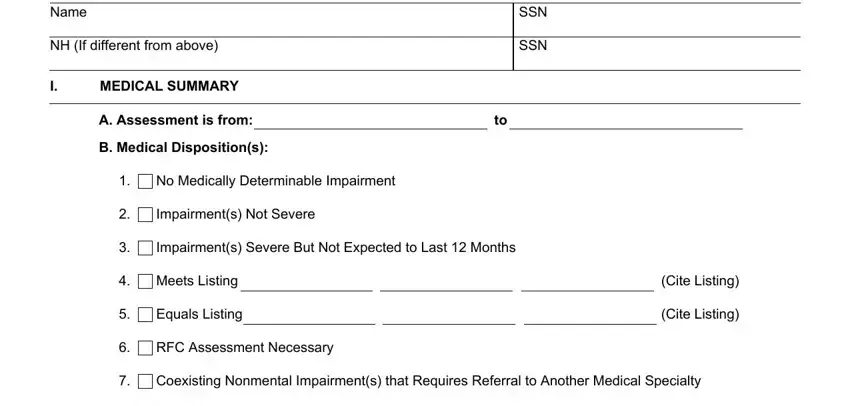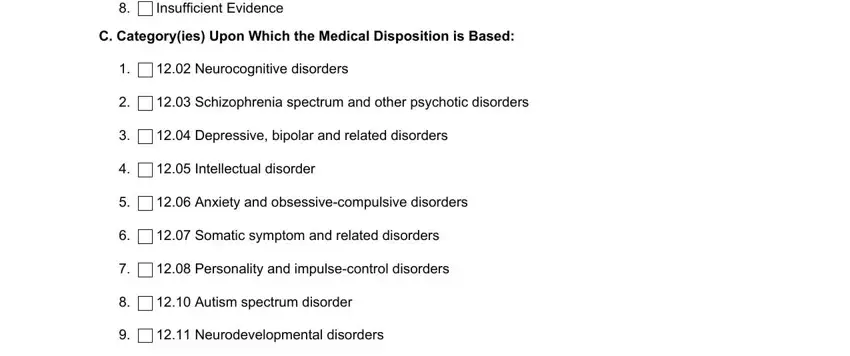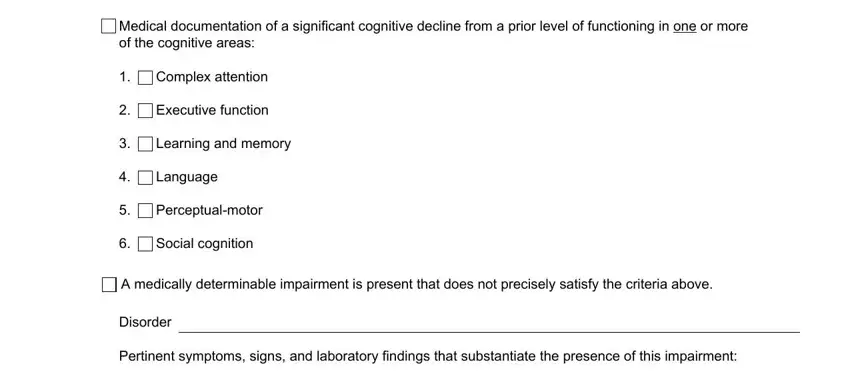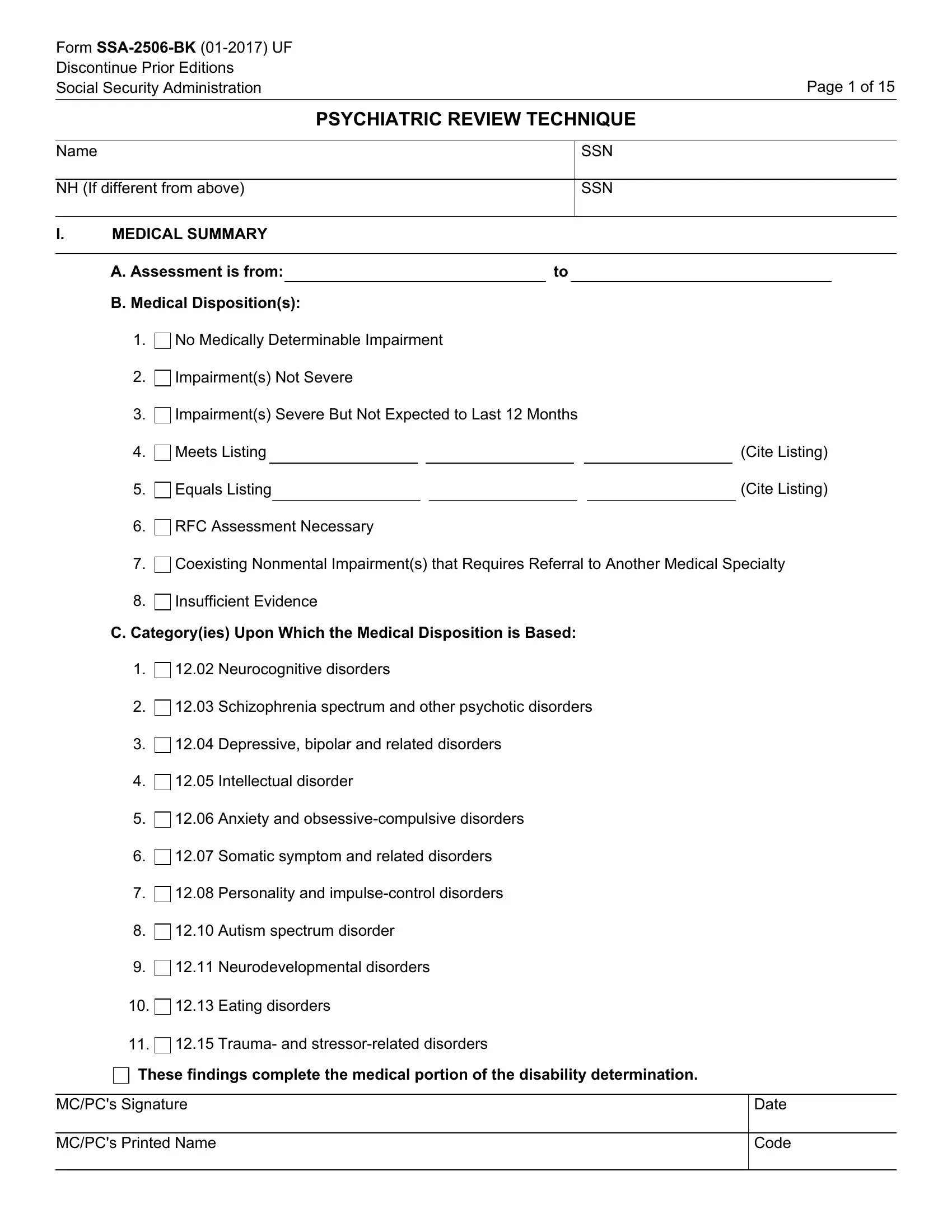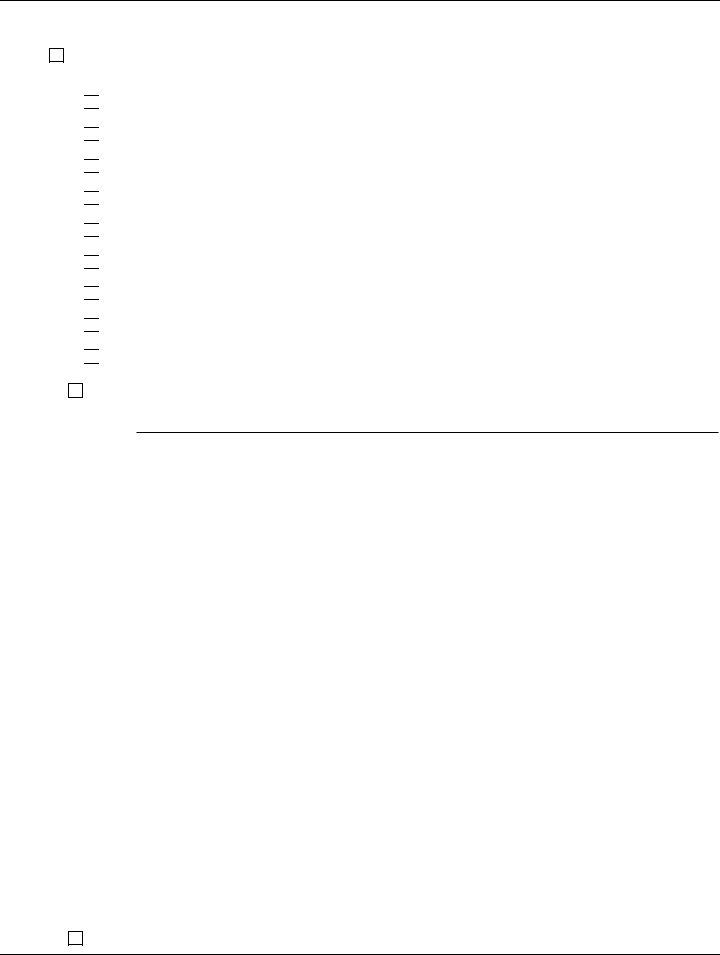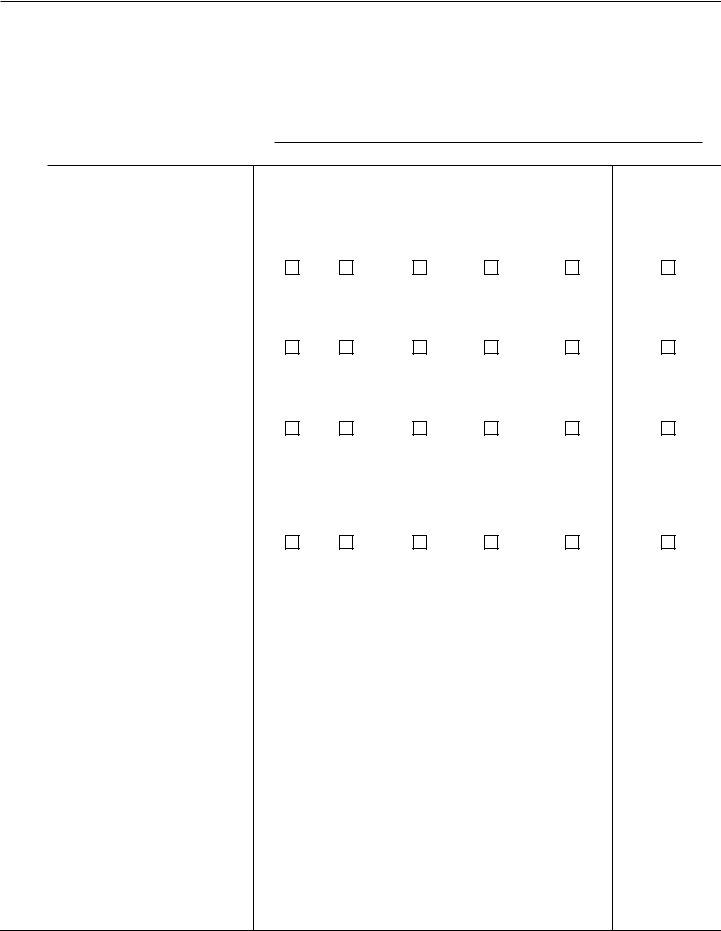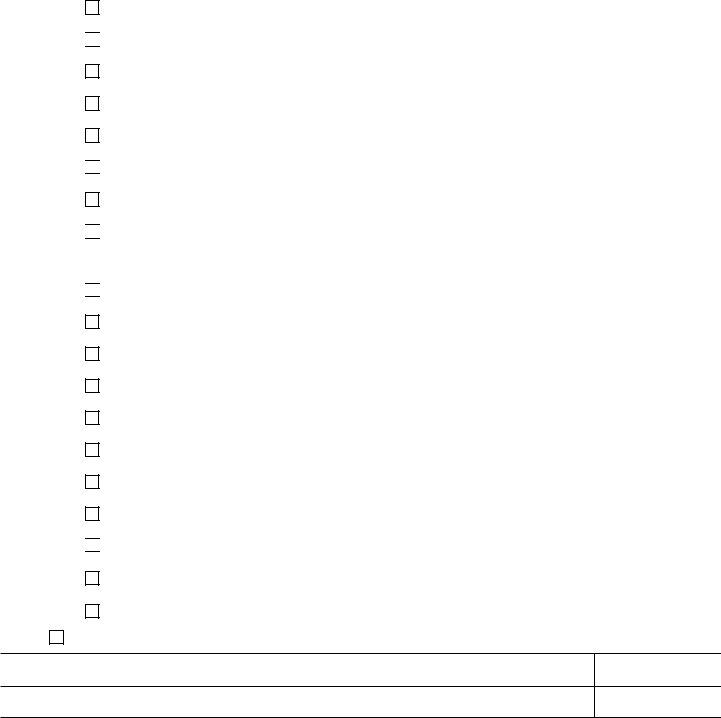
Form SSA-2506-BK (01-2017) UF |
|
|
|
|
|
Discontinue Prior Editions |
|
|
|
|
|
Social Security Administration |
|
|
|
Page 1 of 15 |
|
|
|
|
|
|
|
|
|
|
|
PSYCHIATRIC REVIEW TECHNIQUE |
|
|
|
|
|
|
|
|
Name |
|
|
|
|
|
SSN |
|
|
|
|
|
|
|
NH (If different from above) |
|
|
|
SSN |
|
|
|
|
|
|
|
|
I. |
MEDICAL SUMMARY |
|
|
|
|
|
|
|
|
|
|
|
|
|
|
A. Assessment is from: |
|
|
to |
|
|
|
B. Medical Disposition(s): |
|
|
|
|
|
1. No Medically Determinable Impairment
2. Impairment(s) Not Severe
3. |
Impairment(s) Severe But Not Expected to Last 12 Months |
|
|
|
|
4. |
Meets Listing |
|
|
|
(Cite Listing) |
5. |
|
|
|
|
|
|
|
|
|
|
|
|
(Cite Listing) |
Equals Listing |
|
|
|
|
|
|
|
|
|
|
|
|
|
|
|
|
|
6. RFC Assessment Necessary
7. Coexisting Nonmental Impairment(s) that Requires Referral to Another Medical Specialty
8. Insufficient Evidence
C. Category(ies) Upon Which the Medical Disposition is Based:
1. 12.02 Neurocognitive disorders
2. |
12.03 |
Schizophrenia spectrum and other psychotic disorders |
3. |
12.04 |
Depressive, bipolar and related disorders |
4. |
12.05 |
Intellectual disorder |
5. |
12.06 |
Anxiety and obsessive-compulsive disorders |
6. |
12.07 |
Somatic symptom and related disorders |
7. |
12.08 |
Personality and impulse-control disorders |
8. |
12.10 |
Autism spectrum disorder |
9. 12.11 Neurodevelopmental disorders
10. |
12.13 |
Eating disorders |
11. |
12.15 |
Trauma- and stressor-related disorders |
These findings complete the medical portion of the disability determination.
MC/PC's Signature
MC/PC's Printed Name
Form SSA-2506-BK (01-2017) UF |
Page 2 of 15 |
|
|
II.DOCUMENTATION OF FACTORS THAT EVIDENCE THE DISORDER
A. 12.02 Neurocognitive Disorders
Medical documentation of a significant cognitive decline from a prior level of functioning in one or more of the cognitive areas:
1. Complex attention
2. Executive function
3. Learning and memory
4. Language
5. Perceptual-motor
6. Social cognition
A medically determinable impairment is present that does not precisely satisfy the criteria above.
Disorder
Pertinent symptoms, signs, and laboratory findings that substantiate the presence of this impairment:
Insufficient evidence to substantiate the presence of the disorder (explain in Part IV, Consultant's Notes).
Form SSA-2506-BK (01-2017) UF |
Page 3 of 15 |
|
|
B. 12.03 Schizophrenia Spectrum and Other Psychotic Disorders |
|
Medical documentation of one or more of the following: |
|
1. |
Delusions or hallucinations |
|
2. |
Disorganized thinking (speech) |
|
3. |
Grossly disorganized behavior or catatonia |
|
A medically determinable impairment is present that does not precisely satisfy the criteria above. Disorder
Pertinent symptoms, signs, and laboratory findings that substantiate the presence of this impairment:
Insufficient evidence to substantiate the presence of the disorder (explain in Part IV, Consultant's Notes).
Form SSA-2506-BK (01-2017) UF |
Page 4 of 15 |
|
|
C. 12.04 Depressive, Bipolar and Related Disorders |
|
Medical documentation of the requirements of paragraph 1 or 2: |
|
1. |
Depressive disorder, characterized by five or more of the following: |
|
|
a. |
Depressed mood |
|
|
b. |
Diminished interest in almost all activities |
|
|
c. |
Appetite disturbance with change in weight |
|
|
d. |
Sleep disturbance |
|
|
e. |
Observable psychomotor agitation or retardation |
|
|
f. |
Decreased energy |
|
|
g. |
Feelings of guilt or worthlessness |
|
|
h. |
Difficulty concentrating or thinking |
|
|
i. |
Thoughts of death or suicide |
|
2. |
Bipolar disorder, characterized by three or more of the following: |
|
|
a. |
Pressured speech |
|
|
b. |
Flight of ideas |
|
|
c. |
Inflated self-esteem |
|
|
d. |
Decreased need for sleep |
|
|
e. |
Distractibility |
|
|
f. |
Involvement in activities that have a high probability of painful consequences that |
|
|
|
are not recognized |
|
|
g. |
Increase in goal-directed activity or psychomotor agitation |
|
A medically determinable impairment is present that does not precisely satisfy the criteria above. Disorder
Pertinent symptoms, signs, and laboratory findings that substantiate the presence of this impairment (explain in Part IV, Consultant's Notes, if necessary):
Insufficient evidence to substantiate the presence of the disorder (explain in Part IV, Consultant's Notes).
Form SSA-2506-BK (01-2017) UF |
Page 5 of 15 |
D. 12.05 Intellectual Disorder
Satisfied by A or B:
A. Satisfied by 1, 2, and 3:
1. Significantly subaverage general intellectual functioning evident in a cognitive inability to function at a level required to participate in standardized testing of intellectual functioning
2. Significant deficits in adaptive functioning currently manifested by dependence upon others for personal needs (for example, toileting, eating, dressing, or bathing)
3. The evidence about current intellectual and adaptive functioning and about the history of the disorder demonstrates or supports the conclusion that the disorder began prior to attainment of age 22
OR
B. Satisfied by 1, 2, and 3:
Significantly subaverage general intellectual functioning evidenced by: (a) A full scale (or comparable) IQ score of 70 or below on an individually administered standardized test of general intelligence; or (b) a full scale (or comparable) IQ score of 71-75 accompanied by a verbal or performance IQ score (or comparable part score) of 70 or below on an individually administered standardized test of general intelligence
Significant deficits in adaptive functioning currently manifested by extreme limitation of one, or marked limitation of two, of the areas of mental functioning
The evidence about current intellectual and adaptive functioning and about the history of the disorder demonstrates or supports the conclusion that the disorder began prior to attainment of age 22
A medically determinable impairment is present that does not precisely satisfy the criteria above.
Disorder
Pertinent symptoms, signs, and laboratory findings that substantiate the presence of this impairment:
Insufficient evidence to substantiate the presence of the disorder (explain in Part IV, Consultant's Notes).
Form SSA-2506-BK (01-2017) UF |
Page 6 of 15 |
E. 12.06 Anxiety and Obsessive-Compulsive Disorders
Medical documentation of the requirements of paragraph 1, 2, or 3:
Anxiety disorder, characterized by three or more of the following:
a. Restlessness
Panic disorder or agoraphobia, characterized by one or both:
a. |
Panic attacks followed by a persistent concern or worry about additional panic attacks or their |
|
consequences |
b. |
Disproportionate fear or anxiety about at least two different situations (for example, using |
|
public transportation, being in a crowd, being in a line, being outside of one's home, being in |
|
open spaces) |
Obsessive-compulsive disorder, characterized by one or both:
Involuntary, time-consuming preoccupation with intrusive, unwanted thoughts
Repetitive behaviors aimed at reducing anxiety
A medically determinable impairment is present that does not precisely satisfy the criteria above.
Disorder
Pertinent symptoms, signs, and laboratory findings that substantiate the presence of this impairment:
Insufficient evidence to substantiate the presence of the disorder (explain in Part IV, Consultant's Notes).
Form SSA-2506-BK (01-2017) UF |
Page 7 of 15 |
F. 12.07 Somatic Symptom and Related Disorders
Medical documentation of one or more of the following:
1. Symptoms of altered voluntary motor or sensory function that are not better explained by another medical or mental disorder
2. One or more somatic symptoms that are distressing, with excessive thoughts, feelings, or behaviors related to the symptoms
3. Preoccupation with having or acquiring a serious illness without significant symptoms present A medically determinable impairment is present that does not precisely satisfy the criteria above. Disorder
Pertinent symptoms, signs, and laboratory findings that substantiate the presence of this impairment:
Insufficient evidence to substantiate the presence of the disorder (explain in Part IV, Consultant's Notes).
Form SSA-2506-BK (01-2017) UF |
Page 8 of 15 |
G. 12.08 Personality and Impulse-Control Disorders
Medical documentation of a pervasive pattern of one or more of the following:
1. Distrust and suspiciousness of others
2. Detachment from social relationships
3. Disregard for and violation of the rights of others
4. Instability of interpersonal relationships
5. Excessive emotionality and attention seeking
6. Feelings of inadequacy
7. Excessive need to be taken care of
8. Preoccupation with perfectionism and orderliness
9. Recurrent, impulsive, aggressive behavioral outbursts
A medically determinable impairment is present that does not precisely satisfy the criteria above. Disorder
Pertinent symptoms, signs, and laboratory findings that substantiate the presence of this impairment:
Insufficient evidence to substantiate the presence of the disorder (explain in Part IV, Consultant's Notes).
Form SSA-2506-BK (01-2017) UF |
Page 9 of 15 |
|
|
H. 12.10 Autism Spectrum Disorder |
|
Medical documentation of both of the following: |
|
1. |
Qualitative deficits in verbal communication, nonverbal communication, and social interaction |
2. |
Significantly restricted, repetitive patterns of behavior, interests, or activities |
|
A medically determinable impairment is present that does not precisely satisfy the criteria above. Disorder
Pertinent symptoms, signs, and laboratory findings that substantiate the presence of this impairment:
Insufficient evidence to substantiate the presence of the disorder (explain in Part IV, Consultant's Notes).
Form SSA-2506-BK (01-2017) UF |
Page 10 of 15 |
|
|
I. 12.11 Neurodevelopmental Disorders
Medical documentation of the requirements of paragraph 1, 2, or 3:
One or both of the following:
Frequent distractibility, difficulty sustaining attention, and difficulty organizing tasks
Hyperactive and impulsive behavior (for example, difficulty remaining seated, talking excessively, difficulty waiting, appearing restless, or behaving as if being "driven by a motor")
Significant difficulties learning and using academic skills
Recurrent motor movement or vocalization
A medically determinable impairment is present that does not precisely satisfy the criteria above.
Disorder
Pertinent symptoms, signs, and laboratory findings that substantiate the presence of this impairment:
Insufficient evidence to substantiate the presence of the disorder (explain in Part IV, Consultant's Notes).
Form SSA-2506-BK (01-2017) UF |
Page 11 of 15 |
|
|
J. 12.13 Eating Disorders
Medical documentation of a persistent alteration in eating or eating-related behavior that results in a change in consumption or absorption of food and that significantly impairs physical or psychological health
A medically determinable impairment is present that does not precisely satisfy the criteria above.
Disorder
Pertinent symptoms, signs, and laboratory findings that substantiate the presence of this impairment:
Insufficient evidence to substantiate the presence of the disorder (explain in Part IV, Consultant's Notes).
Form SSA-2506-BK (01-2017) UF |
Page 12 of 15 |
|
|
K. 12.15 Trauma- and Stressor-Related Disorders |
|
Medical documentation of all of the following: |
|
1. |
Exposure to actual or threatened death, serious injury, or violence |
|
2. |
Subsequent involuntary re-experiencing of the traumatic event (for example, intrusive memories, |
|
dreams, or flashbacks) |
|
3. |
Avoidance of external reminders of the event |
|
4. |
Disturbance in mood and behavior |
|
5. |
Increases in arousal and reactivity (for example, exaggerated startle response, sleep disturbance) |
A medically determinable impairment is present that does not precisely satisfy the criteria above. Disorder
Pertinent symptoms, signs, and laboratory findings that substantiate the presence of this impairment:
Insufficient evidence to substantiate the presence of the disorder (explain in Part IV, Consultant's Notes).
Form SSA-2506-BK (01-2017) UF |
Page 13 of 15 |
|
|
III.RATING OF FUNCTIONAL LIMITATIONS A. "B Criteria" of the Listings
Indicate to what degree the following areas of mental functioning (which are found in paragraph B of listings 12.02, 12.03, 12.04, 12.06, 12.07, 12.08, 12.10, 12.11, 12.13, or 12.15 and paragraph B2 of 12.05) are limited as a result of the individual's mental disorder(s).
Specify the listing(s) (i.e., 12.02, 12.03, 12.04, 12.05, 12.06, 12.07, 12.08, 12.10, 12.11, 12.13, or 12.15) under which the items below are being rated
|
AREAS OF MENTAL |
|
DEGREE OF LIMITATION |
|
|
|
FUNCTIONING |
|
|
|
|
|
|
|
|
|
|
|
|
|
|
|
|
|
|
|
|
|
|
|
|
|
Insufficient |
1. |
Understand, remember, or |
None |
Mild |
Moderate |
Marked* |
Extreme* |
Evidence |
|
apply information |
|
|
|
|
|
|
|
|
|
|
|
|
|
Insufficient |
2. |
Interact with others |
None |
Mild |
Moderate |
Marked* |
Extreme* |
Evidence |
|
|
|
|
|
|
|
|
|
|
|
|
|
Insufficient |
3. |
Concentrate, persist, or |
None |
Mild |
Moderate |
Marked* |
Extreme* |
Evidence |
|
|
|
|
|
|
|
maintain pace |
|
|
|
|
|
|
|
|
|
|
|
|
|
Insufficient |
4. |
Adapt or manage oneself |
None |
Mild |
Moderate |
Marked* |
Extreme* |
Evidence |
|
|
|
|
|
|
*Two marked limitations satisfy, or one extreme limitation satisfies, the paragraph B criteria.
Form SSA-2506-BK (01-2017) UF |
Page 14 of 15 |
B. "C Criteria" of the Listings
1. Complete this section if applicable, for 12.02, 12.03, 12.04, 12.06, or 12.15.
Medically documented history of the existence of the disorder over a period of at least 2 years, and there is evidence of both:
Medical treatment, mental health therapy, psychosocial support(s), or highly structured setting(s) that is ongoing and that diminishes symptoms and signs of the mental disorder
Marginal adjustment, that is, minimal capacity to adapt to changes in the environment or to demands that are not already part of daily life
Evidence does not establish the presence of the "C Criteria"
Insufficient evidence to establish the presence of the "C Criteria" (explain in Part IV, Consultant's Notes).
Form SSA-2506-BK (01-2017) UF |
Page 15 of 15 |
|
|
IV. CONSULTANT'S NOTES
